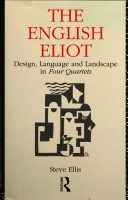Routledge Library Editions: T. S. Eliot
1 primary work
Book 3
T.S. Eliot is widely held to have maintained an unproblematic commitment to England and Englishness in his later writing. "The English Eliot" challenges this view, and in doing so, provides a cultural context for Eliot's writings of the 1930s and 1940s. Responding to critics who see Eliot as a reactionary and marginalized figure in that era, this study affirms the topicality of his thinking about aesthetic form, language and nationhood. The book traces Eliot's classicism not only in linguistic and formalist terms, but also in his construction of England in the "Four Quartets". Eliot's representations are discussed in the context of vigorous polemic concerning England from contemporary material as diverse as painting, advertising, travel literature and the detective novel. Elsewhere, it discusses the relation between nationhood, landscape and religion in the "Quartets", and between Eliot and W.H. Auden, another poet obsessed with the idea of England.
